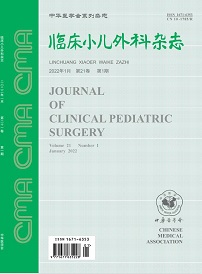Yuan Yuanhong,Zhang Hui,Xiao Zhenghui,et al.Therapeutic effect of plasma exchange on antibody mediated rejection after living relative donor liver transplantation in children[J].Journal of Clinical Pediatric Surgery,,21():425-430.[doi:10.3760/cma.j.cn101785-202202012-006]
Therapeutic effect of plasma exchange on antibody mediated rejection after living relative donor liver transplantation in children
- Keywords:
- Liver Transplantation/MT; Living Donors/CL; Plasma Exchange; Graft Rejection; Immuno- suppression; Treatment Outcome; Child
- Abstract:
- Objective To explore the clinical efficacy of plasma exchange (PE) for antibody mediated rejection (AMR) after living relative donor liver transplantation. Methods Clinical data were retrospectively reviewed for a 7-month-old child with biliary atresia and biliary cirrhosis after living relative donor liver trans- plantation. Tacrolimus plus prednisone was prescribed for anti-rejection therapy after compatible blood type living relative donor liver transplantation. Liver function abnormality was caused predominantly by a postopera- tive elevation of bilirubin within 1 month. Then transplanted liver was biopsied and antibody test of human leu- kocyte antigen (HLA) performed. Results Liver biopsy revealed acute rejection reaction. Based upon the positive result of HLA II antibody and C4d, it could be confirmed as donor specific antibody (DSA) -induced AMR. The regimen was composed of intravenous methylprednisolone pulse, immunoglobulin, mycophenolate and immunosuppressive agents. However, the effect was not satisfactory. And then PE was performed every 2 days for a total of 5 sessions. After 1 -month treatment, liver function gradually normalized. Follow-up was conducted for 3 years. Transplanted liver was biopsied for 5 times and rejection gradually lessened and liver function basically stablized. There was no recrudescence of AMR. Conclusion Postoperative AMR occurs in children with com- patible blood type living relative donor liver transplantation. Early treatment plus PE may be more beneficial to the recovery of acute AMR after liver transplantation.
References:
[1] Valenzuela NM, Reed EF. Antibody-mediated rejection across solid organ transplants:manifestations, mechanisms, and thera- pies[J]. J Clin Invest, 2017, 127(7):2492-2504. DOI:10. 1172/JCI90597.
[2] Demetris AJ, Zeevi A, O’Leary JG. ABO-compatible liver allograft antibody-mediated rejection:an update[J]. Curr Opin Organ Transplant,2015,20(3):314-324. DOI:10. 1097/MOT. 0000000000000194.
[3] Demetris AJ, Bellamy C, Hübscher SG, et al. 2016 Comprehen- sive Update of the Banff Working Group on Liver Allograft Pa- thology:Introduction of Antibody-Mediated Rejection[J]. Am J Transplant,2016, 16(10):2816-2835. DOI:10. 1111/ajt. 13909.
[4] Kim PT, Demetris AJ, O’Leary JG, et al. Prevention and treatment of liver allograft antibody-mediated rejection and the role of the ’ two-hit hypothesis’[J]. Curr Opin Organ Transplant,2016,21(2):209-218. DOI:10. 1097/MOT. 0000000000000275.
[5] Wozniak LJ, Hickey MJ, Venick RS, et al. Donor-specific HLA antibodies are associated with late allograft dysfunction after ped- iatric liver transplantation[J]. Transplantation, 2015, 99(7):1416-1422. DOI:10. 1097/TP. 0000000000000796.
[6] O’Leary JG, Kaneku H, Demetris AJ, et al. Antibody-mediated re- jection as a contributor to previously unexplained early liver al- lograft loss[J]. Liver Transpl,2014,20(2):218-227. DOI:10. 1002/lt. 23788.
[7] Grabhorn E, Binder TM, Obrecht D, et al. Long-term clinical rel- evance of de novo donor-specific antibodies after pediatric liver transplantation[J]. Transplantation, 2015, 99(9):1876-1881. DOI:10. 1097/TP. 0000000000000638.
[8] Tokodai K, Miyagi S, Nakanishi C, et al. Effect of recipient age at liver transplantation on prevalence of post-transplant donor-spe- cific hla antibody[J]. Ann Transplant,2017,22:333-337. DOI:10. 12659/aot. 903926.
[9] 宁禹, 张明满, 郭春宝, 等. 肝移植术后完全停用免疫抑制剂三例儿童临床特点分析[J]. 中华小儿外科杂志, 2017, 38(8):572-574. DOI:10. 3760/cma. j. issn. 0253-3006. 2017. 08. 004. Ning Y, Zhang MM, Guo CB, et al. Clinical characteristics of complete immunosuppression withdrawal in pediatric recipients:a report of 3 cases[J]. Chin J Pediatr Surg, 2017, 38(8):572-574. DOI:10. 3760/cma. j. issn. 0253-3006. 2017. 08. 004.
[10] Tokodai K, Miyagi S, Nakanishi C, et al. Impact of the trough lev- el of calcineurin inhibitor on the prevalence of donor-specific hu- man leukocyte antigen antibodies during long-term follow-up after pediatric liver transplantation:antibody strength and complement- binding ability[J]. Transplant Direct, 2017, 3(8):e196. DOI:10. 1097/TXD. 0000000000000713.
[11] Arias M, Rush DN, Wiebe C, et al. Antibody-mediated rejection:analyzing the risk, proposing solutions[J]. Transplantation,2014, 98(Suppl 3):S3-S21. DOI:10. 1097/TP. 0000000000000218.
[12] Cuadrado A, San Segundo D, López-Hoyos M, et al. Clinical sig- nificance of donor-specific human leukocyte antigen antibodies in liver transplantation[J]. World J Gastroenterol, 2015, 21(39):11016-11026. DOI:10. 3748/wjg. v21. i39. 11016.
[13] 王祥慧. 2019ATC器官移植国际前沿热点及新进展概述[J]. 器官移植,2020,11(2):222-233. DOI:10. 3969/j. issn. 1674-7445. 2020. 02. 007. Wang XH. Overview of international forefront hotspots and new progress on organ transplantation in 2019 ATC[J]. Organ Trans- plantation,2020,11(2):222-233. DOI:10. 3969/j. issn. 1674-7445. 2020. 02. 007.
[14] Valenzuela NM, Hickey MJ, Reed EF. Antibody subclass reper- toire and graft outcome following solid organ transplantation[J]. Front Immunol, 2016, 7:433. DOI:10. 3389/fimmu. 2016. 00433.
[15] Wozniak LJ, Hickey MJ, Venick RS, et al. Donor-specific hla an- tibodies are associated with late allograft dysfunction after pediat- ric liver transplantation[J]. Transplantation,2015,99(7):1416-1422. DOI:10. 1097/TP. 0000000000000796.
[16] Tambur AR, Herrera ND, Haarberg KM, et al. Assessing antibody strength:comparison of mfi, c1 q, and titer information[J]. Am J Transplant,2015,15(9):2421-2430. DOI:10. 1111/ajt. 13295.
[17] Hogen R, DiNorcia J, Dhanireddy K. Antibody-mediated rejec- tion:what is the clinical relevance?[J]. Curr Opin Organ Transplant,2017, 22(2):97-104. DOI:10. 1097/MOT. 0000000000000391.
[18] 巩颖, 郭晖, 钟自彪, 等. 肝移植后急性抗体介导的排斥反应一例诊断和治疗[J]. 中华器官移植杂志,2018,39(8):479-481. DOI:10. 3760/cma. j. issn. 0254-1785. 2018. 08. 007. Gong Y, Guo H, Zhong ZB, et al. Diagnosis and treatment of anti- body-mediated rejection after liver transplantation[J]. Chinese Journal of Organ Transplantation, 2018, 39(8):479-481. DOI:10. 3760/cma. j. issn. 0254-1785. 2018. 08. 007.
[19] 王凯, 王政禄, 孙超, 等. 儿童ABO血型不合肝移植术后抗体介导的排斥反应的诊治经验分析[J]. 实用器官移植电子杂志,2019,7(1):58-61. DOI:10. 3969/j. issn. 2095-5332. 2019. 01. 015. Wang K, Wang ZL, Sun C, et al. Experience in the diagnosis and treatment of antibody-mediated rejection after ABO blood group incompatibility liver transplantation in children[J]. Practical Journal of Organ Transplantation (Electronic Version), 2019, 7(1):58-61. DOI:10. 3969/j. issn. 2095-5332. 2019. 01. 015.
Memo
收稿日期:2022-2-7。
基金项目:国家十二五科技支撑项目(2012BAI04B01);湖南省科技创新重点工程项目(2020SK10141-3);湖南省科技厅重点实验室项目(2018TP1028);湖南省卫生健康委课题项目(C2019019)
通讯作者:肖政辉,Email:xzh2010@163.com
